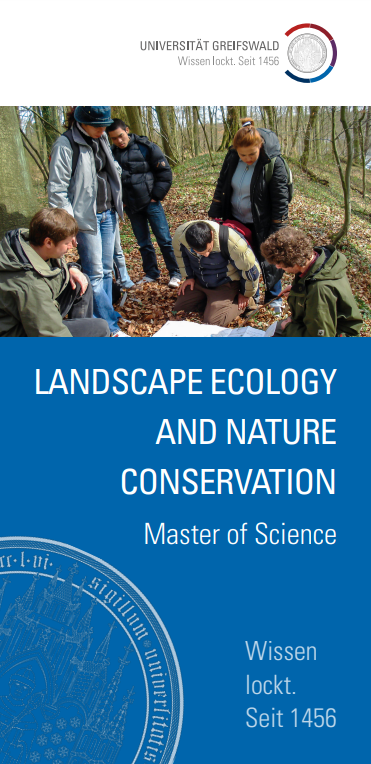The master’s degree course Landscape Ecology and Nature Conservation (M.Sc.)comprises four semesters and a total of 120 ECTS credit points. The degree course is divided into 5 basic and 10 elective modules, as well as the master's dissertation. The language of instruction for the basic modules and the majority of the elective modules is English, so that it is possible to study exclusively in English.
You should bring the following skills with you
Admission to the degree course can be granted to graduates of bachelor’s degrees in landscape ecology, forestry, or biological and agricultural sciences. Graduates from other subject disciplines can be admitted following assessment of the individual circumstances, if previous studies clearly focused on the environment or conservation. Furthermore, applicants must prove English language skills that correspond to level B2 of the Common European Framework of Reference for Languages.
This subject is about
Students of the master’s degree acquire specialised knowledge about conceptual problems in the field of landscape ecology and national and international nature conservation. They gain in-depth knowledge of the contents and methods of the subject "Landscape Ecology and Nature Conservation" and develop competences for independently tackling complex research tasks. The degree course is research-oriented and significantly interdisciplinary. It stands out in particular by supplementing the predominantly scientific training with content from the arts and humanities, law, and business and economics - especially the integration of landscape economy, human geography, environmental law and environmental ethics.
In the focus area biology and landscape ecology, special emphasis is placed on students’ knowledge of species, which is a prerequisite for landscape-ecological analyses and evaluations, as well as the systemic understanding of ecosystems and the changes they undergo. This learning objective is consolidated by excursions in Germany and abroad. In the focus area landscape economy, students acquire knowledge about different theoretical approaches (cost-benefit analysis, price-standard approach) as well as about the possibilities and limitations of a monetary evaluation of natural assets. In the focus area environmental ethics, students are confronted with the critical analysis and justification of various moral concepts, goals and guidelines of conservation and environmental protection. They also receive an introduction to scientific theory.
The spectrum of methods taught to students includes:
- Quantitative analysis of ecological data
- Modelling of changes to the landscape
- Behavioural research and evolutionary biology approaches
- Wildlife radio telemetry
- Conservation genetics
- GIS-based analyses
- Habitat analyses
- Ecological field methods
- Economic evaluation of natural resources
- Cost-benefit analysis
- Discourse analysis
- Argumentation theory
- Qualitative social research
Graduates from this master’s degree course
The degree course aims to train experts for tasks related to sustainable land use and nature conservation in national and international contexts. Graduates pursue professional careers in scientific research, governmental nature conservation, administration of protected areas, conservation associations, foundations, nature-training centres, and in planning bureaus, as well as in international conservation organisations and in political consultancies that specialise in land use and conservation.
General information on the degree course
The degree course provides students with a wide array of possible options and enables them to set their own area of specialisation by allowing them to select their elective modules. Students can choose from more than 50 modules from the fields of biology, landscape ecology and ecosystem dynamics, peatlands studies, environmental economics, environmental ethics, limnology, as well as geography and geology. The degree course is also comprised of a large proportion of exercises, practicals and excursions at home and abroad. Due to limited capacity in particularly popular elective modules and due to unavoidable clashes of course times, we point out that it might not be possible to select and complete every possible combination of elective modules within the standard length of study.
The degree course comprises four semesters and covers a total of 120 ECTS credit points. Studies commence in winter semester. The application deadline for the local admission procedure is 15 July. The language of instruction for the basic modules and the majority of the elective modules is English, so that it is possible to study exclusively in English.


